Home >Common Problem >14 Ways to Fix Bluetooth Audio Not Working on iPhone or iPad
14 Ways to Fix Bluetooth Audio Not Working on iPhone or iPad
- WBOYWBOYWBOYWBOYWBOYWBOYWBOYWBOYWBOYWBOYWBOYWBOYWBforward
- 2023-04-13 15:25:038256browse
Bluetooth audio devices are a great way to enjoy media on the go. No matter where you use your Bluetooth audio device, you can play songs, watch videos, make FaceTime calls, and more. However, many users have recently encountered issues streaming audio over Bluetooth with their iPhones and iPads.
In some cases, the issue appears to stem from misconfigured settings, while in other cases, it appears to be a recent iOS bug. If you've encountered similar issues on your iPhone or iPad, here's a list of fixes that should help you get everything back to normal on your iPhone or iPad.
Bluetooth audio not working on iPhone on iPad? 14 Fixes
The following list of fixes can help you fix Bluetooth audio on your iPhone or iPad. We recommend that you start with the first fix and work your way through the list until you manage to resolve your issue. let's start.
Method 1: Remove and re-pair your Bluetooth device
We first recommend that you try to remove and re-pair your Bluetooth device. You may be looking at a connection related to pairing issues or a background service misconfiguration. Re-pairing your device can help you resolve such issues on iPhone and iPad. Please follow the steps below to help you through the process.
Open the Settings app and tap "Bluetooth".
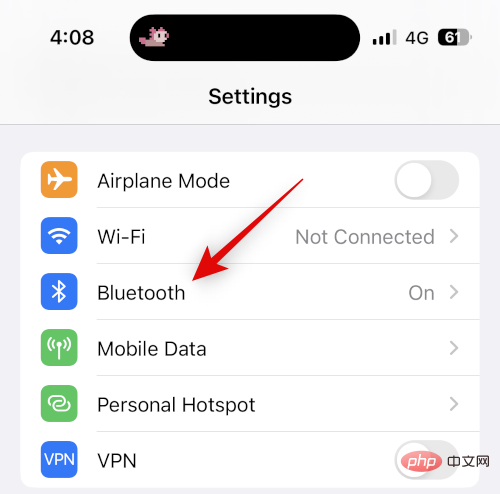
Now click on the  icon next to the Bluetooth device that is facing audio issues.
icon next to the Bluetooth device that is facing audio issues.
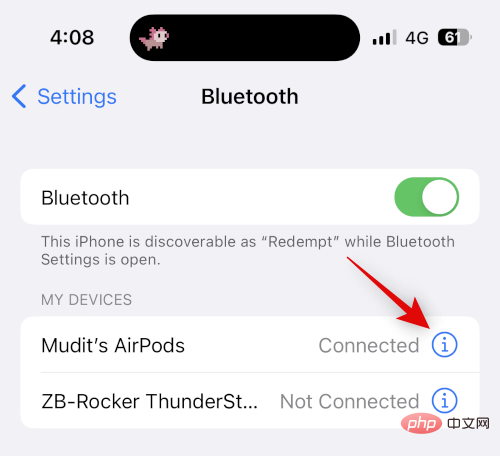
Click Forget this device.
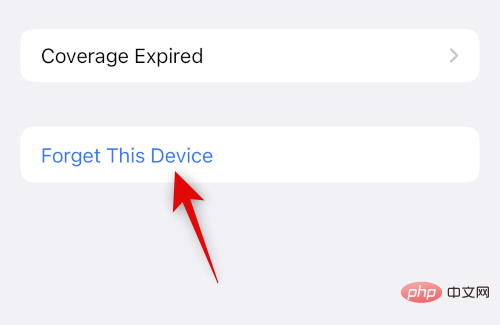
Click Forget this device to confirm your choice.
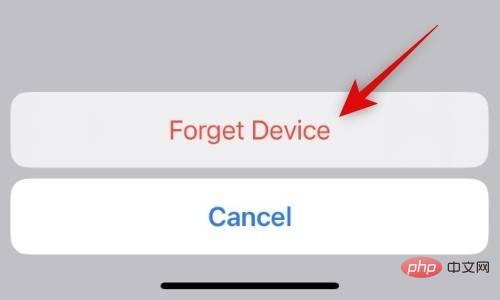
Your iPhone or iPad will now forget about the device. We recommend that you restart your device at this time to ensure that all changes are implemented as required.
After the device restarts, open the Settings app again and tap "Bluetooth."
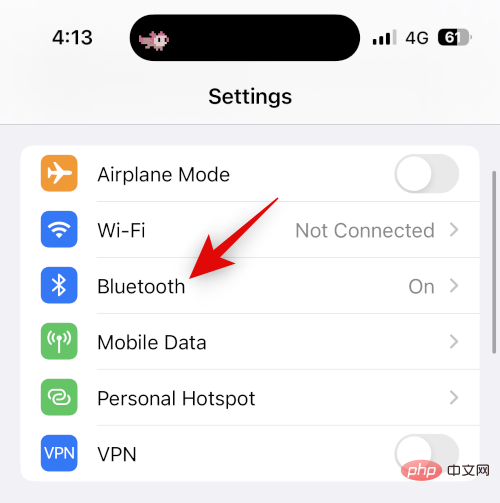
#Make sure the Bluetooth switch on the top is turned on. Now put your Bluetooth audio device into pairing mode and tap on it when it appears under OTHER DEVICES. When we look at the Airpods in this example, the Airpods will appear in their own pop-up window with the option to click Connect.
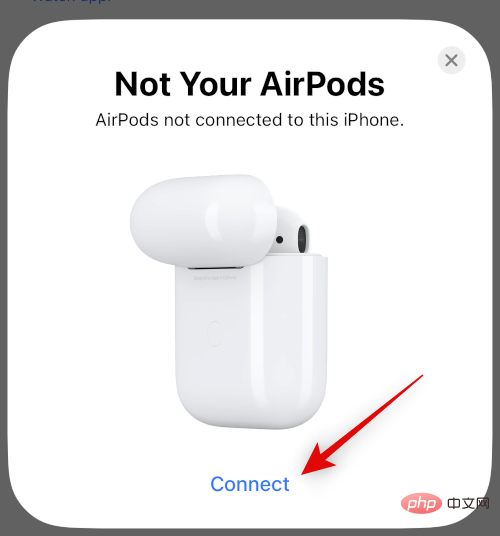
Your iPhone will now pair with the relevant audio device again. Try playing some audio on your iPhone or iPad. If you're having trouble with a connection error, this should have been fixed for you by now.
Method 2: Reset your Bluetooth device (if supported)
Many modern Bluetooth audio devices support device reset. This helps Bluetooth audio devices forget all paired devices when returning to their default factory settings. You may encounter issues due to incorrect device configuration or firmware errors on your Bluetooth audio device. In this case, resetting your device can help resolve most issues.
This is especially true for Bluetooth headphones, Airpods, and 2.1-channel or 5.1-channel Bluetooth speakers. We recommend that you refer to the manufacturer's website to reset your Bluetooth audio device. If you own a pair of Airpods, you can use the following steps to reset your Airpods and re-pair them with your iPhone or iPad.
First place your Airpods back into the box and close the lid. Wait a minute or two (at least 30 seconds) and then open the lid again. Place the Airpods close to your iPhone, and once connected, wear the Airpods again. Don't close the lid yet.
Open the lid, go to the Settings app on your iPhone, and tap " Bluetooth".

Now click  on the icon next to your Airpods.
on the icon next to your Airpods.
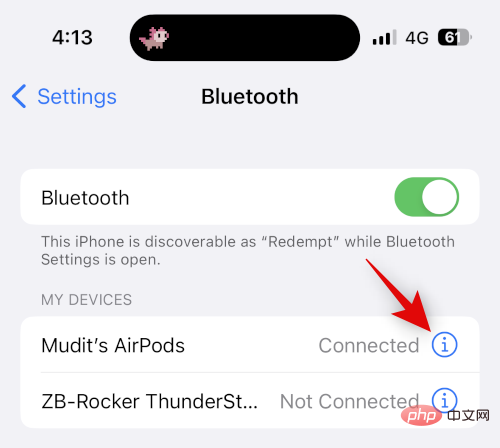
Scroll down and tap Forgot this device.

Click Forget this device again to confirm your choice.

Once your Airpods are unpaired, place them in the case with your device close to them and displaying the battery level.
Open the lid and now press and hold the settings button on your Airpods until the status light flashes amber first and then white.
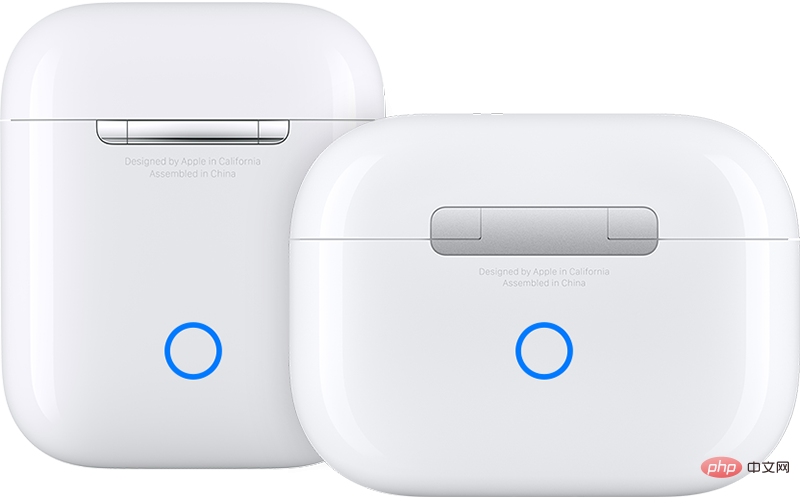
#After the light changes, close the lid, wait a moment, and then open the lid again. Airpods will now display a common name asking to pair with your device again.

You will now reset your Airpods and re-pair them with your iPhone or iPad. If misconfigured device settings or firmware errors are the cause of the problem, you should no longer experience any audio issues.
Method 3: Make sure audio is playing through a Bluetooth device
AirPlay allows you to control and stream audio through multiple nearby devices that have been paired with your device. This allows you to seamlessly transition from one device to another without pairing again and again. However, sometimes your iPhone may try to play audio through a paired device that is currently inactive while you try to get it to stream audio through the Bluetooth device you are currently using.
In this case, you may encounter the following problem: The Bluetooth audio device you are currently trying to use is not playing any audio. We recommend that you use the following tutorial to ensure you select the correct device to play your audio.
Open any music or video streaming app and play a song or video temporarily. Now look for the AirPlay icon. If you are playing a video, the AirPlay icon will look like this . If you are streaming audio, the icon will look like this
. If you are streaming audio, the icon will look like this . Depending on what you choose to stream, click on any icon.
. Depending on what you choose to stream, click on any icon.

You will now see a list of available, paired, and connected devices on which you can stream your playback media. The currently selected device will have a check mark next to it. If the Bluetooth audio device you are trying to use is not selected and does not have a checkmark next to it, tap it to play the audio on the device in question.
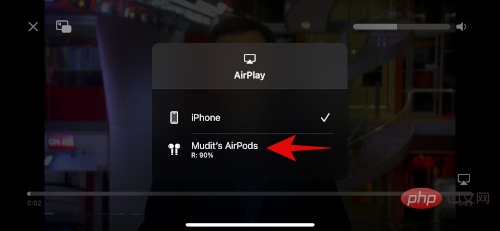
However, if your related Bluetooth audio device does not appear in this list, then you may be facing pairing issues or the Bluetooth audio device is detected as sleeping by your iPhone status or closed. We recommend you use the reset method and re-pairing method above to fix such issues.
That's it! Once you click and select the relevant Bluetooth audio device, your currently playing media will automatically stream to the device. A check mark next to a device indicates the same.
Method 4: Disable automatic ear detection (Airpods only)
Automatic ear detection is a great feature that eliminates having to talk to someone or something every time Improves quality of life by eliminating the hassle of pausing and playing content while interacting. However, this feature relies on sensitive sensors that help detect when you're using the earbuds and when you've removed them from your ears.
Over time, these sensors can degrade and become damaged, causing automatic ear detection to malfunction. This in turn allows you to play, pause and stop currently playing media while you are still using your Airpods. We recommend that you try disabling this feature to see if that resolves your issue. Please follow the steps below to help you through the process.
Open the Settings app on your iPhone and tap Bluetooth.

Now connect your Airpods with your iPhone and tap  the icon next to your Airpods.
the icon next to your Airpods.

Turn off the automatic ear detection switch.
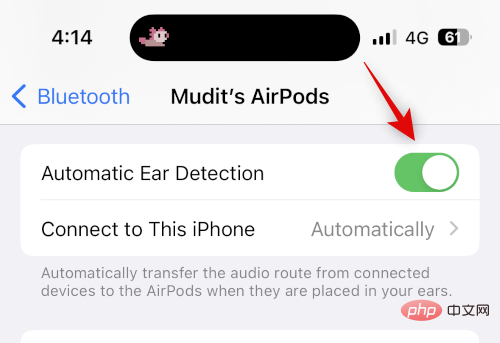
Now turn off and reconnect your Airpods and try playing the song or video again. If you are no longer experiencing audio issues, then we recommend that you check your Airpods as the sensors on both of your earbuds may be faulty.
Method 5: Reinstall your music streaming app
The app may also face errors that may be caused by the current version or misconfigured settings and services during the installation process. Although rare, it is known to be the cause of Bluetooth audio issues on many devices.
We now recommend that you reinstall the relevant application to fix any errors and issues that may be specific to your current setup. Please follow the steps below to help you.
Swipe left and find the relevant app in your app library. Tap and hold the app and select Delete app.
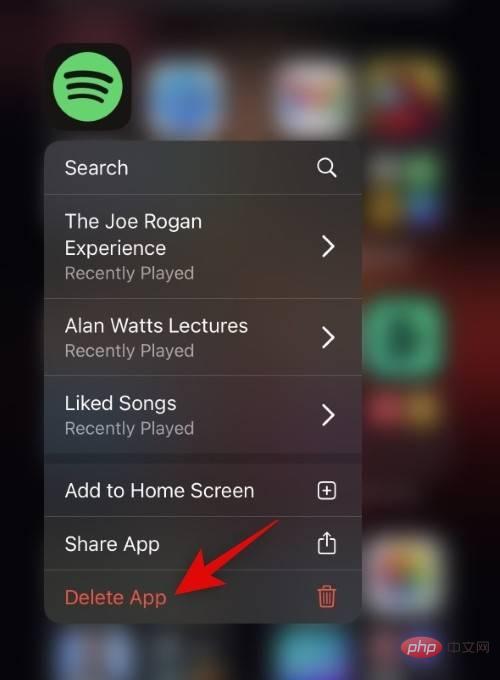
Click Delete again to confirm your choice.
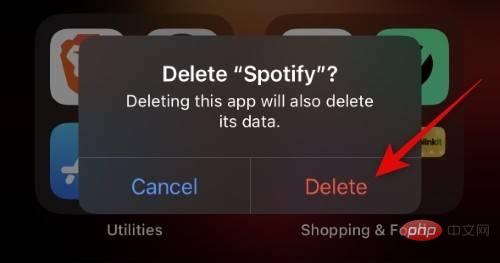
The selected application will now be removed from your device. We now recommend that you perform a force restart to clear all cache and remaining files. Use these steps to perform a force restart on your iPhone or iPad.
- Step 1: Press and release the Volume Up button.
- Step 2: Press and release the volume down button.
- Step 3: Hold the Sleep/Wake button until you see the Apple logo.
Once you see the Apple logo, you can release the Sleep/Wake button and let your device restart normally. Once done, go to the app store and download the relevant app again.
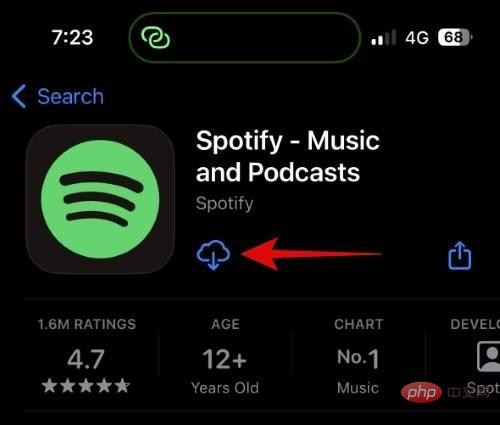
You can now try playing audio through the relevant Bluetooth device. If you encountered app errors or app installation issues, they should now be fixed and you should now be able to stream media to your Bluetooth audio device as expected.
Method 6: If you have multiple connected devices, disconnect the ones you don’t need
Apple devices are designed to detect audio and transmit it seamlessly between nearby Bluetooth devices. This includes not only Bluetooth audio peripherals, but also other Apple devices like Homepods, Airpods, other iPhones, other iPads, Macs, and more. If you have multiple devices, it's possible that the audio was incorrectly detected as being from the device you're currently using and being streamed to another device.
We recommend that you disconnect any such devices that may be connected to your iPhone or iPad and turn off their Bluetooth functionality if possible. This will help you determine if the audio is being transferred to another device. If you are able to easily play audio through the Bluetooth device in question after disabling and disconnecting the other device, then you may be experiencing the same issue.
In this case, we recommend that you remove all related devices and re-pair them to eliminate any bugs and bugs that may be causing these issues in your setup.
Method 7: Temporarily disable AirPlay and Airdrop
AirPlay and Airdrop are important features of the Apple ecosystem that make transferring files and playing media between devices a breeze. But these have been known to cause Bluetooth audio issues with new or unsupported peripherals, especially for users with multi-device setups. We recommend that you try disabling AirPlay and Airdrop to see if that resolves your issue.
If these happen to be the cause of your issues, we recommend contacting the Bluetooth peripheral manufacturer for more information about compatibility with Apple devices. If the device is fully compatible, we recommend contacting Apple Support to further diagnose and resolve your issue. Use the following steps to disable AirPlay and Airdrop on your device.
Open the Settings app and tap "General".
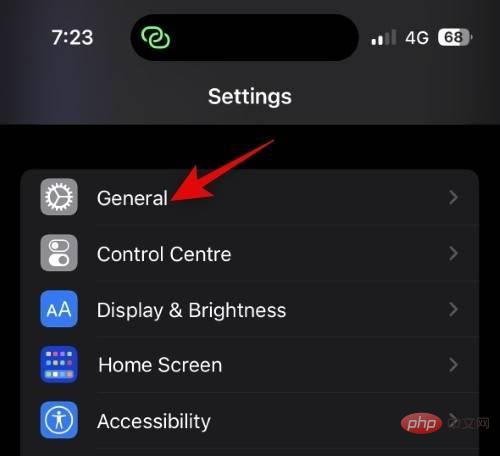
Click Airdrop
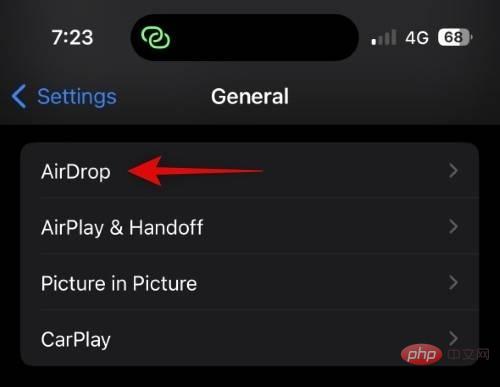
Receive to close.
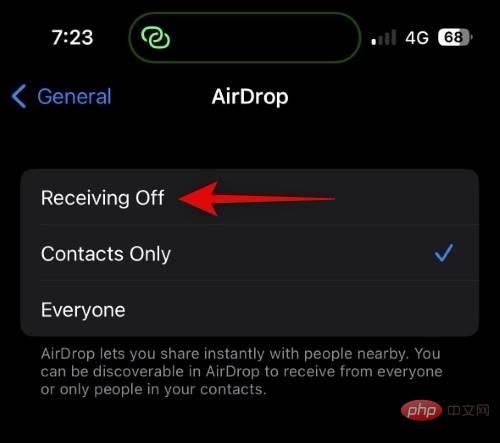
AirPlay & Handoff.
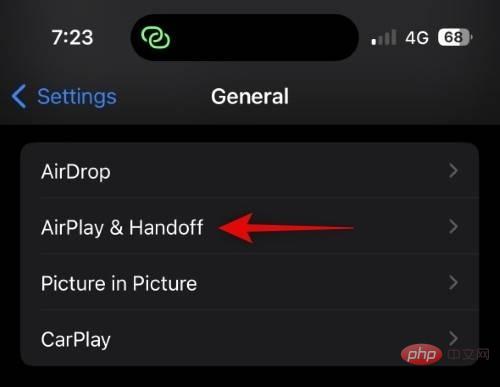
Automatically Airplay to TV.
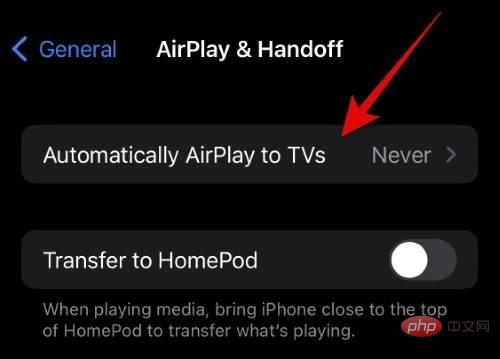
Never.
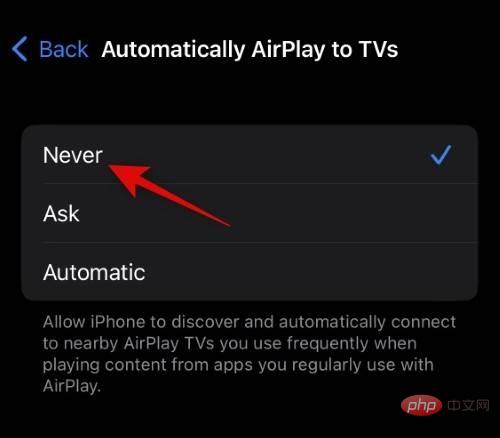
Transfer to HomePod switch.
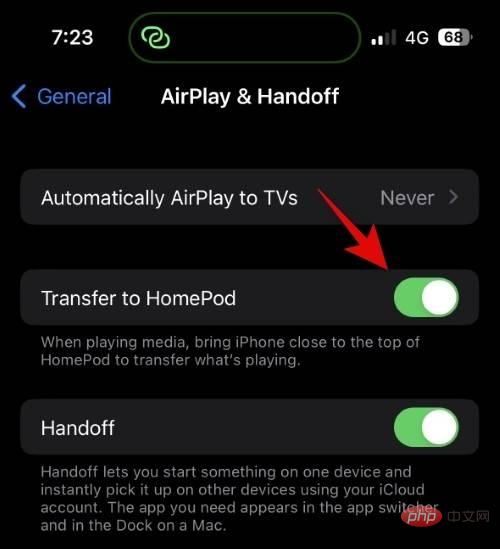
Turn off the toggle switch for Handoff as this feature also relies on Bluetooth to detect nearby devices.
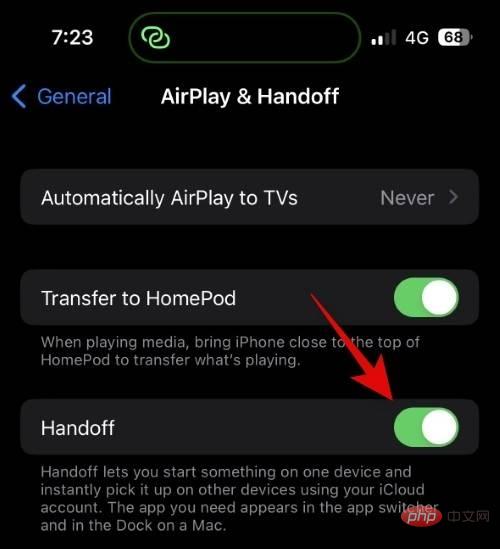
# We now recommend that you use the following steps to force restart your device to clear cache and remaining files. However, this is completely optional and you can skip it if you wish.
- Step 1: Press and release the Volume Up button.
- Step 2: Press and release the volume down button.
- Step 3: Hold the Sleep/Wake button until you see the Apple logo.
After you see the Apple logo, release the Sleep/Wake button. After the device restarts, re-pair the associated Bluetooth audio device with your iPhone or iPad and try streaming media. If you're no longer experiencing audio issues, Airplay and Airdrop may be the culprit in your setup.
Method 8: Disable Apple Watch Unlock
If you are an Apple Watch user, using Apple Watch Unlock is a great feature that seamlessly protects and unlocks your device when you are close to it your device. This feature uses a combination of Bluetooth and Wi-Fi to determine your proximity to your devices and automatically unlock them.
However, this feature has been known to cause problems when playing audio to Bluetooth peripherals, especially those using Bluetooth 4.1 or earlier. We recommend that you try temporarily disabling this feature to see if that resolves your issue. Use the following steps to help you.
Open the Settings app and tap Face ID & Passcode.
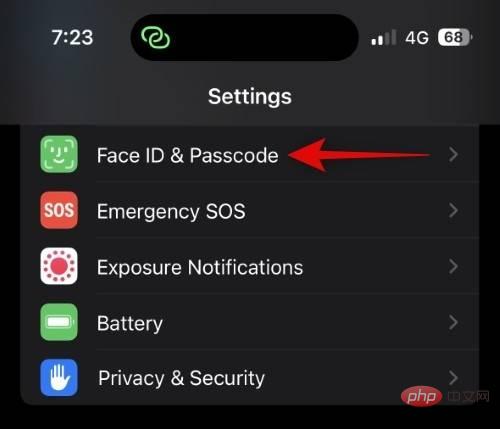
After the system prompts you to verify your identity, please enter your password.
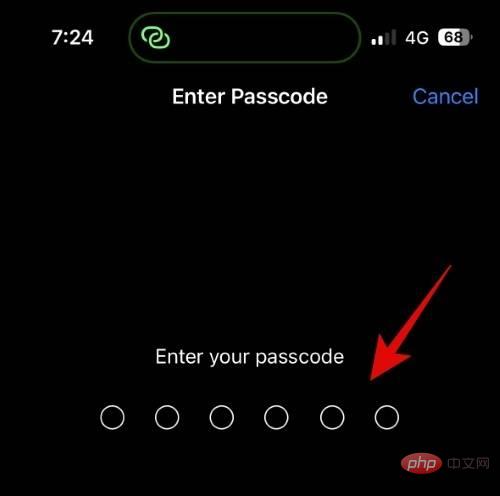
Scroll down to the USE APPLE WATCH TO UNLOCK section, then turn off the Apple Watch switch.
We now recommend that you reboot your device as a precaution. Use these steps to help force restart your Apple device.
- Step 1: Press and release the Volume Up button.
- Step 2: Press and release the volume down button.
- Step 3: Hold the Sleep/Wake button until you see the Apple logo.
After the device restarts, connect to the Bluetooth audio device and try streaming again. If you are no longer experiencing audio issues, then unlocking with your Apple Watch is most likely the cause of the problem. We recommend that you check the Bluetooth version of your audio device to verify compatibility. If it uses Bluetooth 4 or lower, then it's most likely the cause of your problem and there's not much you can do at this point except use a different Bluetooth audio device.
Method 9: Disable Alexa’s Microphone and Bluetooth Permissions
Do you use the Alexa app on your iPhone? Alexa has been known to cause audio stutters, audio interruptions, etc. when streaming media to Bluetooth audio devices. You can resolve this issue by uninstalling the Alexa app. This is a known fix that works for many Apple users around the world using the Amazon Alexa app.
However, if you wish to continue using the app to manage other Amazon devices in your home, you can disable the app's microphone and Bluetooth permissions to resolve Bluetooth audio issues. Use these steps to help you along the way.
Open the Settings app, scroll down, and tap Amazon Alexa.
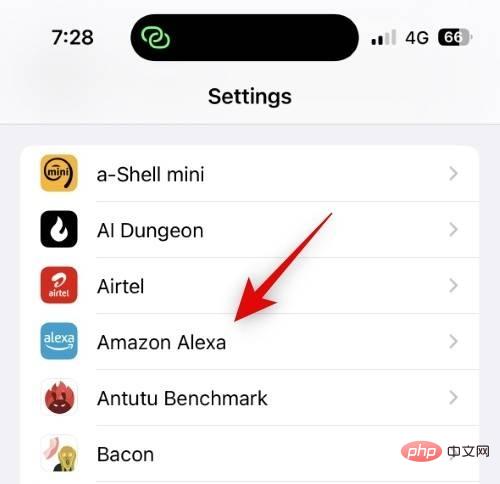
Now click and turn off the Bluetooth switch at the top.
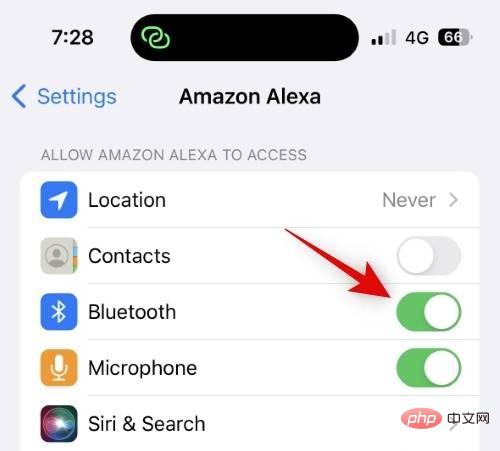
#Similarly, click and turn off the Microphone switch.
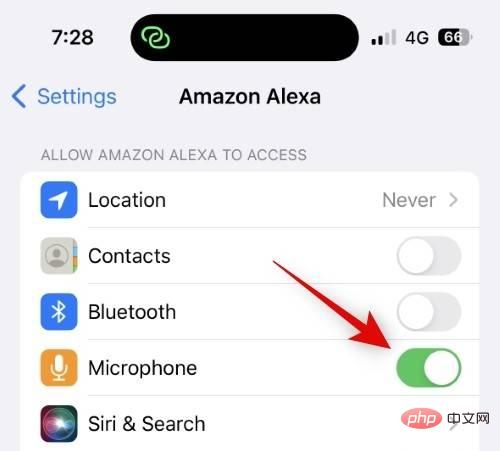
We now recommend that you try playing audio over Bluetooth again. If you are no longer experiencing audio issues, Alexa may be the culprit on your device.
Method 10: Make sure your audio device is using a codec that is supported by Apple
If you have been facing audio quality issues and a degraded experience while using high-end devices, there is a good chance that your headphones use Proprietary audio codec not supported by Apple. Apple devices use AAC and SBC as the default audio codecs. AAC provides the highest quality, while SBC ensures maximum compatibility with all Bluetooth devices currently sold. Your headphones or Bluetooth audio device might not support AAC, which is why your Apple device defaults to AAC.
This is why the audio quality of your high-end headphones or Bluetooth audio device degrades. We recommend that you check the manufacturer's website or product box for more information about the codecs used by your Bluetooth device. If you're lucky, your manufacturer may provide a dedicated app to help you get better quality when playing audio from your iPhone over Bluetooth.
However, if your headphones or Bluetooth audio device uses a proprietary codec, there's not much you can do in that case. Your best bet is to use another device that supports the codecs used by your Bluetooth audio device. A good example of such a device is Sony's line of LDAC headphones like the WH-1000X series, MDR-ZX series, XM4, etc., which use the LDAC codec and do not support AAC.
Method 11: Reset Network Settings
We now recommend that you try resetting your network settings. A network settings reset will reset all connectivity features on your iPhone, including Wi-Fi, Bluetooth, NFC, and more.
This can help you start from scratch while clearing cache files that may be causing Bluetooth audio issues. Keep in mind that all paired devices and saved Wi-Fi networks will be deleted from your device using this process. Therefore, we recommend that you back up the necessary passwords before proceeding with the following tutorial. let's start.
Open the Settings app and tap "General".
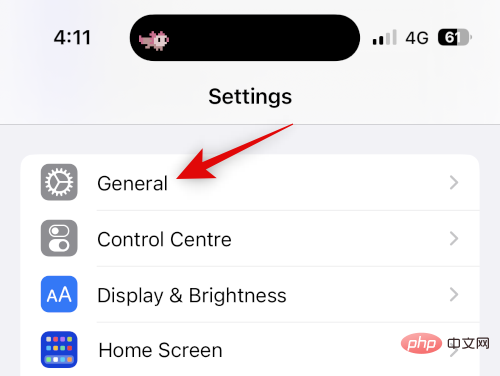
Scroll down and tap Transfer or Reset iPhone.
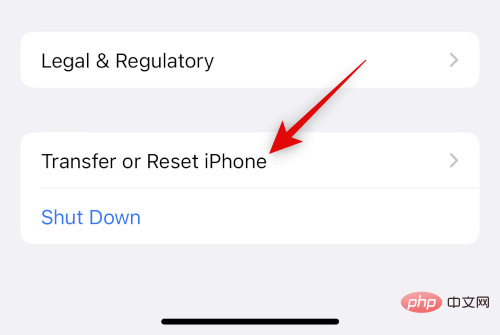
Click and select Reset.
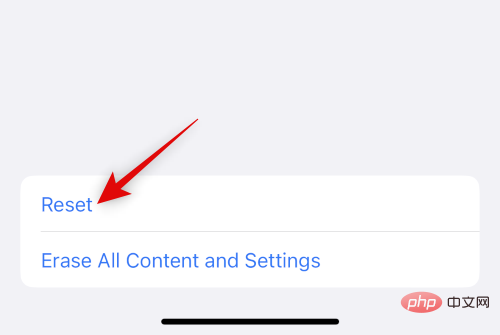
Click Reset Network Settings.
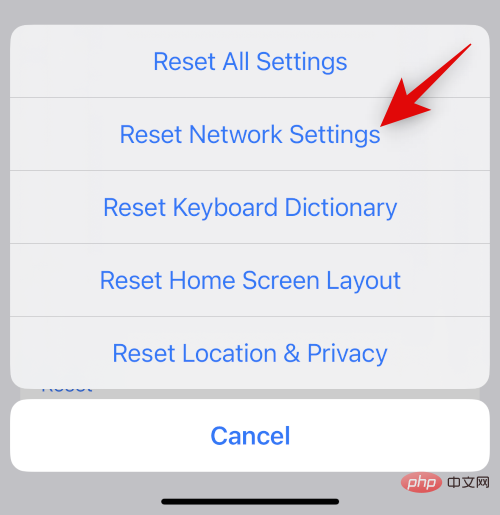
Enter your password when prompted.
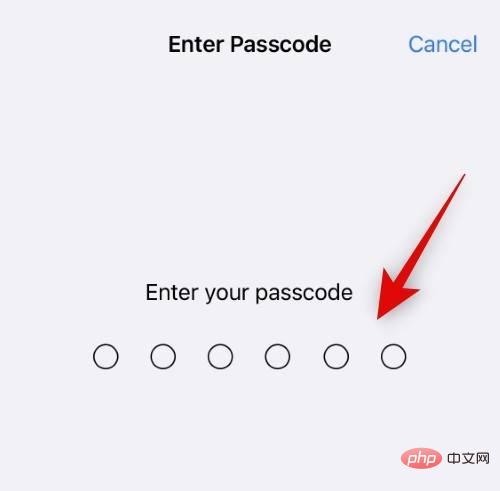
Click Reset Network Settings again.
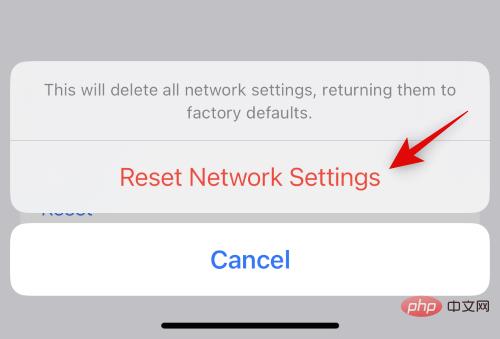
Your device will now restart while resetting all network settings. Once the process is complete, try streaming audio to the relevant Bluetooth device again. If leftover files and misconfigured Bluetooth settings were the cause of your problem, the issue should now be resolved on your device.
Method 12: Reset all settings
If resetting the network settings does not solve your problem, you can try resetting all settings now. This option will reset all configurations on your device to default values, while removing any custom settings and third-party changes. If any other setting on your iPhone is causing issues with Bluetooth audio, then this will help fix the same issue on your device. Use the following steps to help you.
Open the Settings app on your iPhone and tap General.

Scroll down and tap Transfer or Reset iPhone.

Now click Reset.

Click and select Reset All Settings.
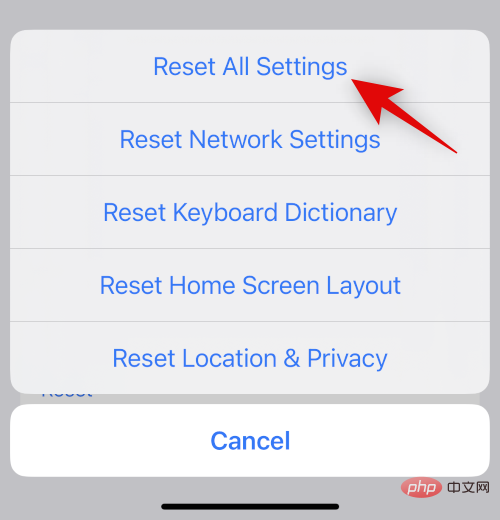
Enter your password to confirm your identity.

Click Reset All Settings again to confirm your choice.
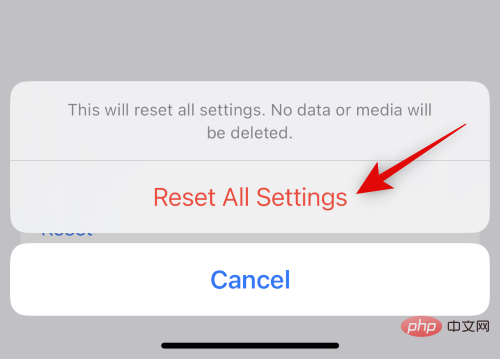
Your iPhone will now restart and reset all settings to default. Once the process is complete and your device boots up, try streaming audio to the relevant Bluetooth device again. If you no longer have audio issues, you may be experiencing issues due to a misconfiguration.
Method 13: Reset your iPhone or iPad
If you are still facing Bluetooth audio issues, it’s time to take some drastic measures. We recommend that you completely reset your device at this time. A full reset will remove all apps and customizations from your iPhone and restore everything to default settings and values.
You can then try streaming the audio to the Bluetooth device in question, and if everything works fine, it may be an app or service from your previous setup that is to blame. You can then try to restore the backup selectively to find out the culprit causing problems with your device. Use the following steps to help you through the process.
NOTE: Resetting will delete all content from your device. We recommend that you perform a full backup using iTunes before proceeding with the tutorial below.
Open the Settings app and tap "General".

Scroll down and tap Transfer or Reset iPhone.

Click Clear All Content and Settings.
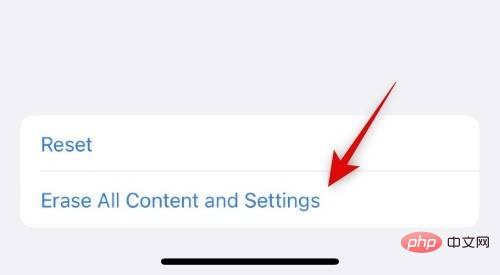
Now, you will see all the apps, data, etc. that will be deleted from your iPhone during this process. Click Continue to continue the process.
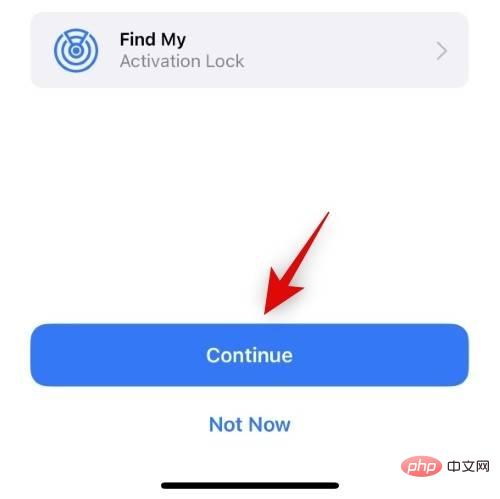
Enter your password when prompted.
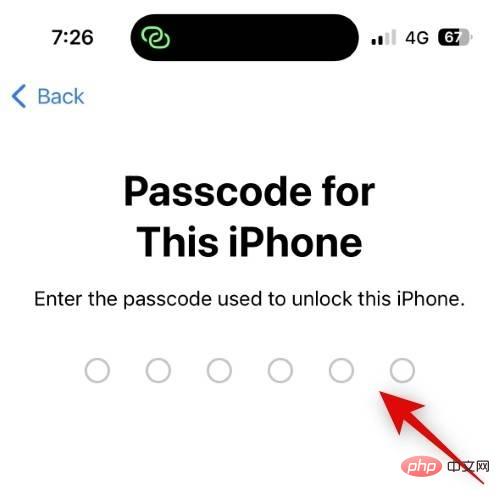
You will now be asked to enter your Apple ID password to close Find . Enter your password and click in the upper right corner of the screen to close.
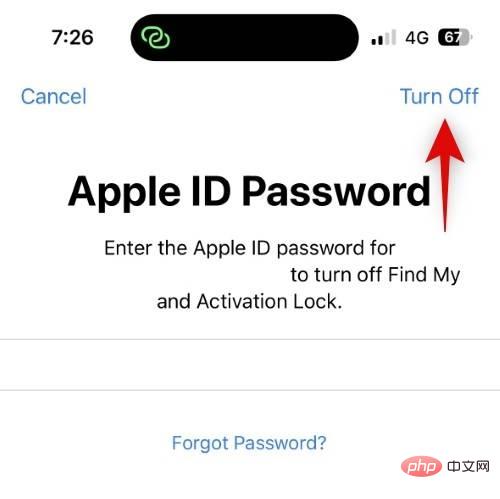
Tap Erase iPhone at the bottom of the screen to confirm your choice.
Your iPhone will now restart a few times as it resets itself. Do not interrupt this process until you see the iPhone welcome screen. You can then set up your device as a new device and test streaming Bluetooth audio to the device in question. If everything is fine, you can selectively restore the backup to find the culprit causing Bluetooth audio issues on your device.
Method 14: Contact Apple Support
If you are still facing Bluetooth audio issues, you may be looking at a hardware fault or an issue specific to your current setup. In this case, Apple support technicians can better help diagnose your device and recommend an appropriate fix. We recommend that you use the link below to contact an Apple Support technician in your area to resolve your issue.
- Apple Support Link
The above is the detailed content of 14 Ways to Fix Bluetooth Audio Not Working on iPhone or iPad. For more information, please follow other related articles on the PHP Chinese website!

